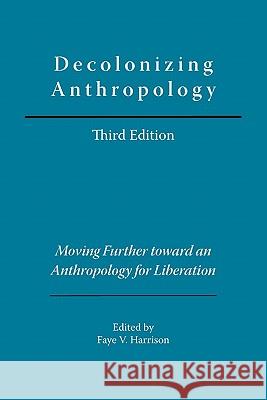Decolonizing Anthropology: Moving Further Toward an Anthropology for Liberation » książka
Decolonizing Anthropology: Moving Further Toward an Anthropology for Liberation
ISBN-13: 9780913167830 / Angielski / Miękka / 1997 / 212 str.
provides a most-needed analysis of the benefits and limitations of the new cultural anthropology. Bolles American Ethnologist, 1994 groundbreaking Levinson The Teachers College Record, 2008 DECOLONIZING ANTHROPOLOGY is part of a broader effort that aims to advance the critical reconstruction of the discipline devoted to understanding humankind in all its diversity and commonality. The utility and power of a decolonized anthropology must continue to be tested and developed. May the results of ethnographic probes--the data, the social and cultural analysis, the theorizing, and the strategies for knowledge application--help scholars envision clearer paths toincreased understanding, a heightened sense of intercultural and international solidarity, and last, but certainly not least, world transformation. TABLE OF CONTENTS Foreword by Yolanda T Moses Preface by Kimberly Eison Simmons Anthropology as an Agent of Transformation: Introductory Comments and Queries by Faye V Harrison Man and Nature, White and Other by Michael L Blakey Colonized Anthropology: Cargo-Cult Discourse by Pem Davidson Buck On Ethnography in an Intertextual Situation: Reading Narratives or Desconstructing Discourse? by Glenn H Jordan Undoing Fieldwork: Personal, Political, Theoretical and Methodological Implications by Deborah D'Amico-Samuels Ethnography as Politics by Faye V Harrison Confronting the Ethics of Ethnography: Lessons from Fieldwork in Central American by Philippe Bourgeois "They Exploited Us But We Didn't Feel It" Hegemony, Ethnic Militancy, and the Miskitu-Sandinista Conflict by Charles R Hale Anthropology and Liberation by Edmund T Gordon Militarism and Accumulation as Cargo Cult by Angelia Gilliam Epilogue by Delmos J Jones











